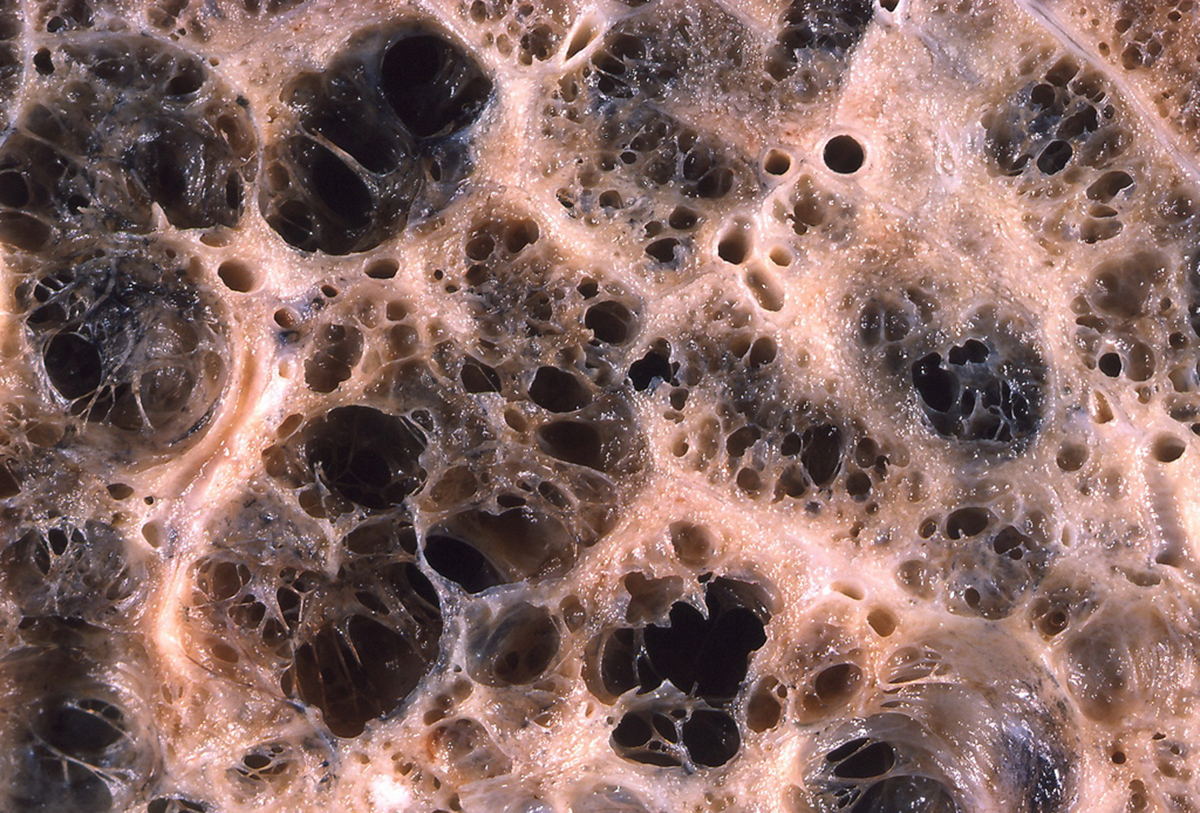Medical science has never been able to find a cure or even a way of preventing emphysema. The way to stop emphysema in its tracks, however, may be as simple as taking an Aspirin a day.
Emphysema is an insidious disease. Now considered the same disease as chronic bronchitis, emphysema is the permanent, abnormal enlargement of the air spaces in the olungs known as bronchioles. When the bronchioles are too large, whether or not they are stiffened by scar tissue, they simply cannot "suck In' enough air to keep the bloodstream supplied with oxygen.
How Common Is Emphysema?
In the United States, about 5% of the population has been diagnosed with either emphysema or chornic bronchitis. Emphysema is 3-1/2 times more common in Oklahoma, the state that has the highest rate of the disease, than it is in Hawaii, the state that has the lowest. Worldwide, anywhere from 8.6 to 22.2 percent of men and 5.1 to 16.7 percent of women have the disease.

What Causes Emphysema?
In the North America, Australia, and Europe, the most common precursor of emphysema is smoking. Many smokers eventually develop emphysema. In the US, 15 to 20 percent of one pack a day smoerks and 20 to 25 percent of two packs a day smokers get the disease.
In the rest of the world, however, the most common risk factor for emphysema is exposure to particulate air pollution. The most intense source of air pollution is not trucks, automobiles, or factories, but rather cooking fuels. Women who have to work with charcoal, animal manures, straw, or wood cookstoves or fireplaces are extremely likely to develop chronic breathing problems.Any kind of exposure to dust increases the risk of the disease.
Genetics also makes a difference. Some people have one or two copies of a gene that codes the proteins for an enzyme inhibitor called alpha-1-antitrypsin, or AAT. In this case, it is an anti-enzyme that helps preserve health. AAT keeps tissue in the lungs from being broken down and replaced by scar tissue. Nonsmokers who ahve two copies of this gene almost enver develop emphysema, while smokers who do have either copy of the gene usually do.
What Happens In Emphysema?
The easiest way to explain emphysema is to liken it to the accumulation of a mass of scar tissue in the lungs. The linings of the lungs are exposed to noxious chemicals in cigarette smoke, cigar smoke, cooking fire smoke, dust, or industrial chemicals, the immune system sends white blood cells to remove the damage.
The kind of white blood cells it sends, known as macrophages, are unusually large. Moreover, they communicate by a process known as chemotaxis to signal the immune system to send still more macrophages to get involved in the process. While these white blood cells are very efficient at removing dead lung cells, bacteria, dust, and particulate matter from smoke, they are relatively clumsy inside the tiny blood vessels that serve the lung. They get "stuck" and die. The immune system sends still more macrophages to remove the dead macrophages, and the second wave leads to a third, and so on. Eventually the delicate lining of an air sac is destroyed, and replaced by scar tissue. The scar tissue does not have the flexibility to receive a large amount of air, and less and less air gets into the bloodstream.
Emphysema: Aspirin To The Rescue
Taking an Aspirin a day is believed to stop this process. It may even be found to be the most effective emphysema treatment. Researchers are not quite sure why.
One possibility, medical researchers at the Columbia Medical Center in New York City reported at the American Thoracic Society 2015 International Conference, is that Aspirin just helps blood flow better through the lungs. After all, greatly to simplify the process, Aspirin is a blood thinner. Thinner blood flows through the lungs more freely and can carry more oxygen into general circulation.

Another possibility, also proposed by the doctors at Columbia, is that Aspirin is acting as platelet-activating factor (PAF) inhibitor. Platelet activating factor is an important chemical in producing blood clots, but it is also an important chemical in stopping inflammatory and allergic reactions. Functioning as a PAF-inhibitor, Aspirin stops the allergic inflammation that breaks down lung tissue and brings macrophages into the lungs.
Yet another possibility is that Aspirin is interrupting inflammation at another step. If lung tissue is not destroyed by inflammation, however this happens, then it is not replaced by scar tissue.
How Big A Difference Does Taking Aspirin Make?
The researchers followed 4,469 men and women who did not have coronary artery disease. A majority of these volunteers, 55 percent, had been smokers, but many had never smoked at all. The participants in the study were given four CT scans to measure atherosclerosis in their lungs over the ten years of the study. The CT scans also detected calcifications, emphysema-like changes in the lungs. Most of the volunteers were also tested with a technique called spirometry to measure breathing capacity.
Every time the volunteers came in, they were asked which medications they had taken in the previous three weeks. About 20 percent of volunteers for the study reported that they had taken Aspirin. When the doctors looked at changes in breathing capacity and accounted for previous smoking, gender, age, and high blood pressure, they noted that:
- Patients who had ever smoked, but took Aspirin at least three times a week, lost lung capacity at a rate 0.37% slower than patients who did not take Aspirin.
- Patients who had relatively advanced emphysema, indicated by a low spirometry reading, who took Aspirin, declined at a rate 0.93% slower than patients who did not take Aspirin.
In other words, if you have emphysema, taking Aspirin slows it down measurably. It's not a cure. It does not stop the disease. However, it helps preserve the lung. If you already have bad emphysema, Aspirin is even more useful in fighting the disease, although it is not a cure in the worst cases of emphysema, either.
READ World Lung Cancer Awareness Month: New Treatments Are On The Horizon
Necessary Disclaimers
The researchers who did this study point out that their results show correlation, not causation. It is possible that people who take Aspirin make healthier choices in general. That could account for the slower deterioration of the lungs due to emphysema. However, taking an Aspirin a day, even a 81-milligram children's Aspirin, seems like an easy way to secure at least a little protection against the ravages of emphysema, provided the doctor approves. Because Aspirin can interfere with certain medications (such as Brilinta after a heart attack), and because some people are allergic to it, always ask your doctor before adding a daily Aspirin to your health routine.
- Caverley P, Augusti A, Anzueto, et al, eds. Global Initiative for Chronic Obstructive Pulmonary Disease. In: Global Strategy for the Diagnosis, Management, and Prevention of Chronic Obstructive Pulmonary Disease. Medical Communications Resources
- 2008.
- Kling J. Aspirin a Day Keeps Emphysema Away, Early Study Alludes. Medscape Medical News. 27 May 2015.
- Photo courtesy of Pulmonary Pathology via Flickr: www.flickr.com/photos/pulmonary_pathology/4563270814
- Photo courtesy of Pulmonary Pathology via Flickr: www.flickr.com/photos/pulmonary_pathology/4563270814
- Photo courtesy of brx0 via Flickr: www.flickr.com/photos/atul666/237027107
- www.eurekalert.org/pub_releases/2015-05/ats-rau050815.php
- http://www.medscape.com/viewarticle/845454 (Registration may be required.)

